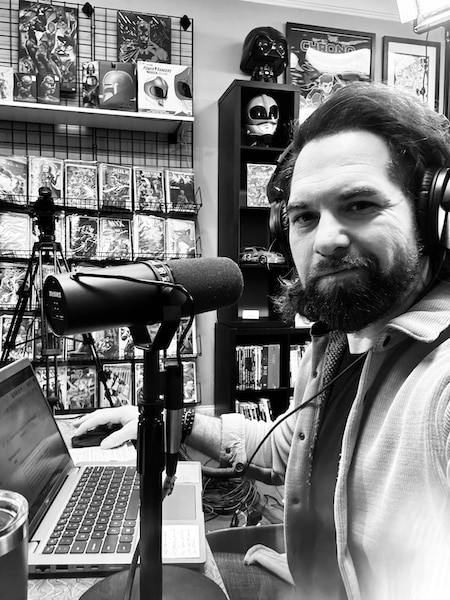WHS grad talks teen struggles

A Waterloo High School graduate recently published a book discussing mental health, development and a host of other topics pertaining to teenagers, hoping to use his knowledge as a teacher to paint a more detailed picture of what modern youth grapple with on a daily basis.
Dr. Jordan Lauer’s book is titled “The Two Backpacks: Understanding Teens and What They Carry.” With a collection of real stories and substantial research, it serves as a reminder of how complex teen life can be for parents, teachers and anyone working with young people.
Lauer is originally from Chicago but moved to Waterloo with his family when he was 7.
After graduating from Waterloo High School, he attended Murray State University in Kentucky, then moving to and teaching history in Nashville, Tenn.
He has since moved to Columbia, Tenn., having acquired his master’s degree in educational leadership from Arkansas State University and a doctorate in learning organization and strategic change from Lipscomb University in Nashville.
Working in the classroom for 16 years now – also serving as a middle school football coach for four years – Lauer noted one aspect of his job he considers key is connecting with his students.
“A big part of teaching for me is building relationships. I always try to make it to where I’m a teacher that students can trust and come to if they need to talk about something,” Lauer said. “I always tell them, ‘Hey, if it’s something that endangers you or somebody else, I’m gonna tell that to somebody, but you can talk to me about stuff.’”
Along with his relationships with students, Lauer also discussed some of what he’s heard about teens from his fellow educators.
“In a teacher’s lounge, we go in there and eat lunch, and obviously a lot of times teachers kinda blow off steam and talk to each other, have a little bit of fellowship, and obviously work comes up,” Lauer said. “Throughout the years, I kept hearing the same basic refrain said about a lot of students, teenagers, just with a different kind of catalyst, a different factor.”
He further explained that he heard teachers voice the same complaint regularly, bemoaning how students don’t care about school.
Lauer explained the common concern every teacher points to today is phones and social media, though extrapolating and speaking with longtime teachers, he’s recognized these same complaints have been said about texting, video games, hanging out with friends and various other potential distractions through the years.
Noting how these same concerns were likely voiced by teachers back when he was a student, Lauer described how he wanted to look into what was the real issue, the real disconnect between adults and teens.
His research and thought ultimately led him to the recognition that adults often forget how complex teen life can be.
“I came to the realization that when a kid walks into our homes, our classrooms, they’re carrying two backpacks,” Lauer said. “One is visible. That’s the one we all buy, and inside of it is their homework, a stick of deodorant, probably a super smashed granola bar… The other one is invisible, but it’s heavy. It weighs down their shoulders. They’ve got to drag it around. That contains emotions, trauma, social pressure and standard brain development, just to name a few.”
While he currently hosts a podcast called “Education Warfare” which covers various aspects of modern teaching, his new book is meant to help adults recognize and respond to that second “backpack.”
Offering an overview of the book, Lauer noted how he strived to keep the book light with his own sense of humor throughout. While trying to avoid getting too formulaic with each chapter, he includes an assortment of research he’s done along stories collected from fellow teachers to explore their interaction with students.
With the book including nine chapters along with a foreward written by a local principal, one chapter focuses on how teens are often viewed as “little adults” – though this characterization can lead to trouble as adults don’t properly consider their brain development and how their thought processes can be led by emotions even more so than adults.
Another subject the book covers is familial conflict, with an argument arising as one person gets angry which causes the other person to get angry, leading to a cycle in which communication can break down entirely, though adults taking the time to consider and recognize what their child is dealing with personally might help communication open up again.
Lauer further noted how adults acting as adults by trying to facilitate communication and apologizing when they’ve done something wrong can have a tremendous impact.
“A child, a teenager seeing an adult heartfeltly apologize and explain why they did what they did and what they were feeling – especially for males, especially if it’s the father doing it to the male – just really, all the research shows, can put that teen down a different path of development because now they know ‘Hey, I’m a man, and I can be vulnerable and emotional and say I’m wrong,’” Lauer said.
Additional topics Lauer mentions include peer relationships and the importance of teens interacting with friends and youth relationships with social media and technology.
Lauer also noted his book includes a series of sample dialogues, offering readers a means of facilitating communication and hopefully avoiding unproductive arguments.
“Instead of blaming other things, if we really start to understand those things, we could have a lot of our conversations, interactions with teens be stronger, be better instead of slammed doors and eye-rolls – which you’ll still get,” Lauer said. “I point that out. You’re probably still gonna get all those things, but if you know that it’s not really out of disrespect, it’s because they’re trying to build their identity.”
Lauer emphasized that a major goal of the book is to explore and explain what teens face in their lives without a sense of judgement.
He noted that, with his own education and his appreciation of the teaching community he’s been in over the years, he wanted to give back in some way.
“My biggest thing is I hope it causes one less slammed door, one less angry text because you asked them to take out the trash and they forgot,” Lauer said.
“The Two Backpacks: Understanding Teens and What They Carry,” is currently available on Amazon and at jordanlauer.com.






